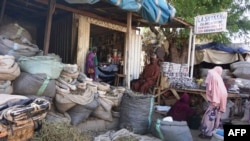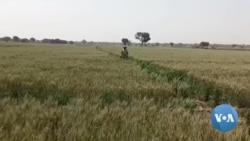Mmachukwu Orizu started her baby formula business six years ago after quitting her former job as a medical lab scientist.
She uses grains such as corn, rice and brown wheat to make her recipes. She then packages them and prepares them for delivery.
But because of Russia’s war in Ukraine, she’s not sure when she will get her next supply of wheat, and she said scarcity of wheat also is affecting the prices of other ingredients.
Orizu is the founder of Somma's Yummies.
"I use wheat alongside oats and yam flour to produce that particular one," Orizu said. "I won't lie to you, to even get it is difficult. It's not just about the increase in price. To get the wheat is difficult now because I buy in bulk. I've made a lot of calls to some of my suppliers."
Orizu said with a key ingredient hard to come by these days, business has not been the same. She said she's beginning to look for other alternatives, even though she is concerned about her customers’ preferences.
"When you produce, and you're not going to make your profit, it becomes a problem. It wouldn't be a business anymore," Orizu said. "I'm already trying to research on how to switch wheat for something else. What we have in mind for now is acha — that's acha (grain). I'm taking between now and Friday to make that decision."
Since Russia invaded Ukraine in February, grain prices have been rising steadily. At the onset of the war, the Food and Agriculture Organization of the United Nations said the price of a bushel of wheat immediately rose by 5.7%.
But even before then, the price of wheat in Nigeria had increased by about 30% due to shortages at home. The Wheat Farmers Association of Nigeria said local production of wheat here meets less than 10%.
Nigeria imported an average of $2 billion worth of wheat in 2020 and 2021, mostly from the United States and Russia, according to the country's statistics bureau.
However, the Nigerian Manufacturers Association (MAN) said grain shortages are not the only problem. Before the Russian invasion, businesses were already struggling with electricity and fuel shortages, inflation, poor infrastructure and growing insecurity.
Segun Ajayi-Kadiri is the director general of Manufacturers Association of Nigeria (Man).
"Insecurity has made the supply chain internally very difficult," Ajayi-Kadiri said. "The most impacted parts of the country also happen to be the belt that we get most of our foods from. Apart from the fact that there's insecurity, the roads are also bad. We have had challenges — now it is compounded by the fact that people cannot even farm."
Nigerian authorities blame the electricity shortage on the collapse of the national grid multiple times since January.
Authorities also said the recall in January of 170 million liters of tainted fuel from circulation led to fuel shortages.
Many businesses, like Usman Mohammed's bakery, are cut off from power and rely on diesel fuel to power generators. But he said that, too, has tripled in price since the beginning of the year.
"Each day, we use a lot of diesel, because electricity is very scarce," Mohammed said, "So, we need to buy diesel a lot. It has affected our production and the price of bread."
For now, many business owners like Orizu and Mohammed are just getting by and hoping for better days.






